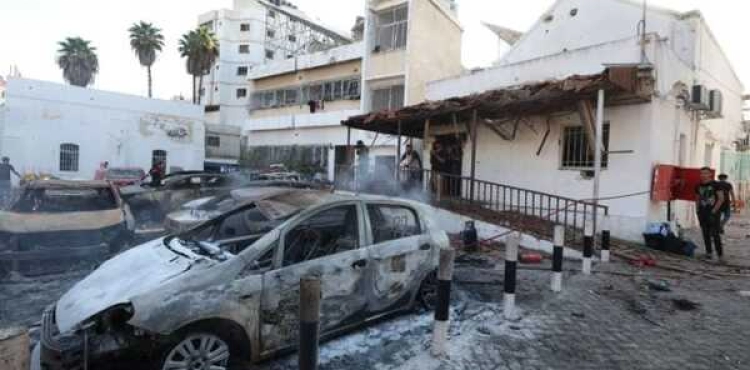The occupation forces committed a horrific massacre, the largest in decades in the history of the Palestinian conflict, when they bombed those fleeing from death in the courtyard of the Baptist Hospital in Gaza, which led to the death of 500 Palestinians, the majority of whom were children, and the injury of hundreds of others.
The Arab National Hospital (Baptist) is a local institution that provides health care to residents of different areas of the Gaza Strip. It belongs to the Anglican Episcopal Church in Jerusalem, and is considered one of the oldest hospitals in Gaza.
“Al-Mamadani” is located in one of the residential squares in the Al-Zaytoun neighborhood in the Gaza Strip, surrounded by the Church of St. Porphyrius, the Al-Shamaa Mosque, and the cemetery of Sheikh Shaaban, according to a report on “Al-Jazeera Net.”
“Al-Baptist” is one of the oldest hospitals in Gaza City. It was founded at the end of the 19th century AD by the missionary mission of England. It was managed by Reverend “Elliot” and was succeeded by Dr. Bailey, then Dr. Stirling. It was the only hospital in the region between Jaffa and Port Said, and provides its services to approximately 200 people. A thousand people.
In World War I, “Al-Maamdani” was destroyed, stolen, and looted. Then it was rebuilt and called “Arab National Hospital” in 1919. It remained under the management of Dr. Stirling until 1928, then its management was transferred to Dr. Alfred until 1948.
At that time, the Evangelical missionary mission affiliated with England decided to close the hospital with the end of the British mandate over Palestine, but the Baptist mission took care of the hospital, so they took it and transferred its management to it, and Gaza at that time belonged to Egypt.
A dispute occurred over the ownership of this hospital in the 1940s and 1950s, following the Egyptian administration’s abolition of the Civil Endowment Law in Gaza, which exposed the hospital’s property and lands to an ownership dispute.
It continued to provide its services despite the Israeli occupation of the area, and its officials also continued to develop it, building a second floor, which included an office for two doctors, a laboratory, and three rooms allocated for various therapeutic purposes. The laboratory also included services for training local students and accrediting them as laboratory technicians. The hospital established the first physical therapy unit in the sector.
In 1976, UNRWA cut off aid to Al-Maamdani and stopped its support for the hospital’s nursing school, so its work declined and the number of its employees was reduced. At the beginning of 1977, the hospital had only 3 doctors and 28 nurses, and the number of patients it received began to decrease. By the end of the seventies, its ownership returned to the Episcopal Diocese of Jerusalem.
At that time, the name of the “Ahli Arab Hospital” was changed and it was funded by the United Palestinian Society of America, and it continued to provide its services and receive patients and injuries during the various wars, starting with the first Palestinian Intifada (December 1987) and ending with the “Al-Aqsa Flood” war in October. 2023.
The hospital has developed significantly and its departments have multiplied, becoming an integrated health institution containing different departments, namely:
– Emergency Department, which operates around the clock.
- Department of Surgery.
– Department of Orthopedic Surgery.
– Operations Department.
- maternity section.
– Pharmacy Department.
- Department of Physical Therapy.
– Burns Department.
- Laboratory Department.
– Department of Radiology and Mammography.
– The outpatient department provides its services seven days a week except Sunday.
The Anglican Church condemns the massacre
The Anglican Episcopal Church in occupied Jerusalem condemned the massacre carried out by occupation aircraft at the Baptist Hospital in Gaza.
The church said in a statement issued by it that, coinciding with the day of fasting and prayer for peace, which was declared by the patriarchs and heads of churches in Jerusalem, the Arab National Hospital in Gaza, which is affiliated with the Anglican Episcopal Church, was brutally attacked, according to the Palestinian News Agency (Wafa).
She added, “Hospitals are considered safe havens, according to the principles of international humanitarian law, but this attack exceeded those sacred boundaries.”
He continued: “We responded to the call of the Archbishop of Canterbury, Justin Welby, who called for the protection of medical facilities and the cancellation of evacuation orders. “It is unfortunate that Gaza is still deprived of safe havens.”
The Anglican Episcopal Church said, “The destruction we witnessed, along with the desecrated targeting of the church, strikes at the core of human morality,” stressing that the Israeli attack “deserves international condemnation and punishment.”
The Church issued an urgent appeal to the international community “to fulfill its obligations to protect civilians and ensure that such horrific, inhumane acts are not repeated.”
The Church expressed its grief over the loss of countless lives who lived in its facilities, declaring a day of mourning in all its churches and institutions, and appealed to “friends, partners and individuals of good will to stand in solidarity, denouncing the heinous attack on our dedicated staff and vulnerable patients.”












